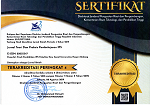Perubahan pola pembelajaran PKn yang tekstual ke pola kontekstual (CTL)
Abstract
The development of science and technology has brought great influence to educational technology which further influences learning technology and ultimately to the patterns of learning from conventional/ traditional (textual and teacher only learning) patterns to transition patterns (semi textual and teacher together media) and finally to modern patterns (contextual and media as learning resources). This is very influential on the pattern of learning Civic that is conventional/traditional textual to contextual learning patterns. The current reality in Indonesia is that civic learning is still dominated by conventional systems, so that the application of contextualized oriented learning is still far from expectations, as evidenced by the still serious learning problem, where most students can not relate what they have learned and applications in his current and future life. This occurs because the lesson of civics is less related to the material with the reality of student life, not contextual, consequently civics fails in carrying out its mission to develop civics competence namely civics knowledge, civics disposition and citizenship skills. In carrying the contextualized oriented civics learning, conventional learning system in schools is increasingly believed to be a system that is not effective anymore and resulted in learning Civics felt less meaningful for students To solve the problem of learning civics less meaningful, it is necessary to use contextual teaching approach learning) as one effective alternative. The application of contextual learning is an urgent need to solve the civic problems.
Keywords
Full Text:
PDFReferences
Abdul, A.W. & Sapriya. 2011. Teori dan Landasan Pendidikan Kewarganegaraan. Bandung: Alfabeta CV.
Ardhana, W., Kaluge,l. dan Purwanto. 2004. Pembelajaran Inovatif untuk Pemahaman dalam Belajar Matematika dan Sains di SD, SLTP dan SMU. (Laporan Penelitian Hibah Pasca Angkatan II, Tahun Pertama). Direktorat Penelitian dan Pengabdian Kepada Masyarakat, Direktorat Jenderal Pendidikan Tinggi, Depdiknas, Jakarta.
ATEEC Fellows. 2000. Teaching for Conterxtual and Teaching Learning (online) , Tersedia: http / / www.ateec.org / curric / ctlinfo.cfm 24k (30 Maret 2006).
Atiomo, William. 2009. A Constrfouctivist Stratetgy for Medium / Large Student Groups The Contextual Lerning Model. The Open Medical Education Journal. 2009., 2, p 1-9 University of Nottingham, UK
Bern, R.G. and P.M. Erickson, 2001. Contextual teaching and learning: Preparing students for the new economy. The Highlight Zone: Researc h a Work No. 5. http://www.eric.ov/ERICWebPortal / custom / portlets / recordDetails / detailmini.jps? nfpb=true & ERICEExtSearch Search Value O=ED452376&ERICExtSearch Search Type O=no&accno=ED45237
Blanchard, A.2001. Contextual teaching and learning. Educational services, horizons electronic lesson plans resource. http; / / Coe.csusb.edu / scarcella / helpr.pdf.
Branson, .M.S. 1999. Making the case for civic education: Where we stand at the end of the 20 th Century. CCE, Washington DC. Hgttp: / / www.civiced.org / papers / articles mb june99.html
Branson, M. (1998). Belajar Civic Education dari Amerika, Jogyakarta: Lembaga Kajian Islam (Lkis) dan The Asia Foundation (TAP).
Budimansyah, D. (2008). Model Pembelajaran Berbasis Portofolio: Mata Pelajaran PKn. Bandung: PT Genesindo.
Caine, R.N., & Caine, G. (1991). Making Connections: Teaching and the Human Brain. New York: Addison-Wesley.
Darma, Susila. Dkk. 2013. Pengaruh Pendekatan Pembelajaran Konst ektual terhadap Hasil Belajar Pkn ditinjau dari minat Belajar Siswa. Jurnal PPS Universitas Pendidikan Ganesha Jurusan Pendidikan Dasar. Volume 3 tahun 2013 halaman 1-12. Singaraja: PPS Undiksha.
Deen, IFRAJ shamsid and Bettye P Smith. 2006. Contextual Teaching and Learning Practices in the Family and Consumer Sciences Curriculum. Journal of Family and Consumer Sciences Education. Vol 24 No. 1 2006. Columbia: University of Georgia.
Departemen Pendidikan Nasional (2001). Kamus Besar Bahasa Indonesia, Jakarta: Balai Pustaka.
Departemen Pendidikan Nasional. 2003. Pendekatan Kontekstual (Contextual Teaching and Learning / CTL). Jakarta: Ditjen Dikdasmen.
Departemen Pendidikan Nasional. Dirjen Dikdasmen. 2003. Pengembangan Kurikulum dan Sistem Penilaian Berbasis Kompetensii (disajikan dalammn Workshop MGMP SMU Jawa Timur Tahun 2003). Surabaya: Dinas Pendidikan dan Kebudayaan Propinsi Jawa Timur
Departemen Pendidikan Nasional (2003). Undang-Undang No. 20 tahun 2003 tentang Sistem Pendidikan Nasional, Jakarta: Depdiknas.
Departemen Pendidikan Nasional. 2003. Pendekatan Kontekstual (Contdextual Teaching and Learning (CTL). Jakarta: Ditjen Dikdasmen.
Falk,, John and Martin Storksdieck.2005. Using The Conntextual Mod eof Learning to Understand isitor Learning from a Science Center Exhibition. Science Lerrning in Everyday Life Journal. Vol 21 No. 41 Juli 2005 / USA: Published Wiley Science
Firmansyah, Arif. 2010. Implementasi Pendekatan Konstektual dalam meningkatkan Prestasi Belajar Pkn Siswa di Sekolah Dasar. Volume 2 no 16 halaman 1 -9.
Fogarty, R. (1991). How to Integrate the Curriculum. Illinois: Skylight. Fraenkel, J.R. (1984). How to Teach about Values: An Analytic Approach. New Jersey: Prentice- Hall, Inc.
Hall, Cedric and Joanna Kidman. 2004. Teaching and Learning: Mapping the Contextual Influences. International Education Journal. Vol 5 No. 3 2004. Victoria: University of Wellington
Joni, T.R. (2005). Pembelajaran yang Mendidik: Artikulasi Konseptual, Terapan Kontekstual, dan Verifikasi Empirik. Malang: PPs Universitas Negeri Malang.
Johnson, E. B. (2007). Contextual Teaching and Learning: What It Is and Why . It is Here to Stay, California USA: Corwin Press. Inc.
Komalasari, K. 2008. Pengaruh Pembelajaran Kontekstual dalam Pendidikan Kewarganegaraan terhadap Kompetensi Kewarganegaraan Siswa SMP. Disertasi Doktor pada Sekolah Pasca Sarjana Universitas Pendidikan Indonesia. Tidak Diterbitkan.
Komalasari, K. 2009. Efek dari Pembelajaran Kontekstual dalam Pendidikan Kewarganegaraan pada Kompetensii Kewargannnegaraan Siswa. Journal of Social Sciences.Volume 5 Nomor 4, hal 261-270. Bandung: UPI
Muslich, M. 2014. KTSP Pembelajaran Berbasis Kompeten si dan Kontekstual. Jakarta; Bumi Aksara.
Nurhasanah, N . 2009.. Penerapan Pendekatan Konstektual unuk Meningkatkan Kualitas Pembelajaran Pendidikan Kewarganegaraan pada Siswa SD Laboratorium PGSD FIP UNJ Jurnal Pendidikan Penabur. Nomor 12 tahun ke 8 Juni 2009. Jakarta: Univ Negeri Jakarta.
Padmadewi, N.N. 2007. Profil Masalah Guru Sekolah Dasar Se Kecamatan Buleleng dalam Melaksanakan Proses Pembelajaran . Jurnal Pendidikan dan Pengajaran No. 2 Halaman 375-385. Singaraja: Undiksha
Pursika, N. 2009. Model Rekonstruksi Nilai Demokrasi dan Nasionalisme dalam Pembelajaran Pkn Melalui Pendekatan Multikultur (Suatu Penelitian Pengembangan Pendidikan untuk Memperkuat Integritas Kebangsaan Melalui jalur Pendidikan Formal). (Laporan Penelitian ). Singaraja:: Lembaga Penelitian Universitas Pendidikan Ganesha.
Samsuri, 2011. Bahan kajian Kuliah Umum di Program Studi Pendidikan Pancasila dan Kewarganegaraan (PPKN) FKIP Universitas Ahmad Dahlan, Yogjakarta, 9 Mei 2011. Makalah Disajikan dalam diskusi tentangbest practice pembelajaran Pkn, dalam kajian mandiri kewarganegaraan di Program Studi PIPS Sekolah Pasca Sarjana Universitas Pendidikan Indonesia, Bandung, Semester Genap 2008 / 2009.
Sawitri, Eka Ni Pt. 2013. Penerapan Pendekatan Pembelajaran Kontekstual untuk meningkatkan Keaktifan dan Hasil Belajar Pkn Kelas v SD Negeri 3 Sebatu Gianyar. Jurnal Jurusan PGSD Universutas Pendidikan Ganesha. Singaraja: Jurusan PGSD Undiksha,
Sounders. (1994). Contextually Based Learning: Fad or Proven Practice, (Online) Tersedia: http://www.uga.edu / fb070999.htm (16 Juni 2003).
Soemantri, N. (2001). Menggagas Pembaharuan Pendidikan IPS. Bandung: Remadja Rosdakarya.
Suryadi, A. (2006). "Model Pembelajaran Alternatif Menuju Reformasi Pembelajaran (School Reform)" dalam Pendidikan Nilai Moral dalam Dimensi Pendidikan Kewarganegaraan. Bandung: Laboratorium Pendidikan Kewarganegaraan FPIPS UPI
University of Washington (college of Education). 2001. Training for Educational Team in Contextual Taeching and Learning. Seatle: UW-USA.
Wirta, I.K. 2011. Pengaruh Implementasi Model Pembelajaran Konstektual Berbasis Asesmen Kinerja terhadap Hasil Belajar IPS Siswa kelas VIII di SMP Negeri 2 Nusa Penida ditinjau dari Minat Belajar Jurnal Ilmiah Pendidikan dan Pembelajaran. Volume 7 (halaman 1987-1999). Singaraja: PPs Undiksha.
Refbacks
- There are currently no refbacks.
Editorial and Administration Office:
This Journal is published by Prodi Pendidikan IPS, Fakultas Ilmu Sosial, Universitas Negeri Malang
Semarang St. No. 5 Building I3-102 65145.
Phone. (0341) 551312. line. 376 (19)
Homepage: http://journal2.um.ac.id/index.php/jtppips/index
email: jtp2ips.journal@um.ac.id
JTP2IPS INDEXED BY:
e-ISSN 2503-5347
ISSN 2503-1201
JTP2IPS is licensed by CC BY 4.0.










